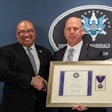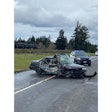Having trained thousands of law enforcement officers in the proper response to and resolution of critical incidents, we watched the Columbine tragedy as courageous tactical officers executed a hurried but effective plan to safely "clear the school."
Because police work has many similarities to an athletic contest, we use sports analogies in our critical incident training program. Police officers, like athletes, must perform in the "public eye" under tremendous stress and pressure. The self-proclaimed experts then scrutinize the decisions made, or not made. They sit back in their armchairs, not having to make split-second decisions. Many have never played the game, yet they are quick to criticize. This same type of second guessing holds true in police work-we're seeing it now with the Columbine incident-except the stakes in our arena are much higher!
No one except the officers who developed and executed the plan to enter the school had the initial information that was available-sketchy as it was-during the first few minutes of the siege. Litigation is forthcoming which places a "shroud of silence" on those directly.
We do know that within 30 minutes of arriving at the scene tactical teams began to deploy. Yet many continue to question the failure of the officers to "get in quicker." These comments are irresponsible and broach a challenge to these officers' oaths of office. Do we think they were afraid? This is what we are inferring by questioning the actions of the officers, without the benefit of the crucial information available at the moment decisions were being made. One tactical commander had a son inside that school. Would anyone truly believe that he didn't want to get in quicker?!
There is no doubt that we must examine this incident carefully because there are lessons to be learned. We have trained police supervisors for more than 10 years, using simulation exercises on a 'model city' to enhance critical incident management skills. The training provides supervisors with the experience and skills to stabilize and resolve a critical event. It also stresses the importance of conducting an after-action review in which three questions are asked: What happened? What was our response? What would we do differently the next time?
Recently, a police supervisor in our program said, "I would hope that one of our officers wouldn't stand outside of that school while children were being killed." This is an understandable, yet disturbing comment. The decision by some law enforcement officers and supervisors to "just get in there," is why we have been tagged in "weapons of mass destruction" incidents, as the "second wave of victims." Law enforcement's traditional response to critical incidents is very often to rush in without considering the consequences or the dangers involved. The lack of a proper risk assessment by the initial responding supervisor may place subordinates and those responding in greater danger.
A response plan that standardizes tasks to be accomplished is needed. It was quite clear that the police, fire and emergency medical services (EMS) agencies involved coordinated their efforts.
If the first responding officer's decision at the onset of the Columbine incident had been to immediately "get in the school," imagine the chaos that would have resulted had no perimeters been established. Parents, the media and others would have rushed into that school. Maybe this is what the "thugs" wanted.
The chaos and confusion of the Columbine incident was handled in a controlled, professional and coordinated manner. The officers involved were heroes that day and don't deserve the criticism that they have received.
Let's leave the armchair quarterbacking to those who have never played the game, because those of us who have "played the game" know the skill and courage it takes!
Patrol Commander Vincent Faggiano recently retired from the Rochester (N.Y.) Police Dept. where he'd worked since 1966.
Thomas T. Gillespie began a career in law enforcement in 1970. In 1987 he founded Criminal justice Training & Consulting Services and is a scheduled panel member this month in Richmond, Va., at ASLET's forum on mass violence.
This is their first contribution to POLICE.






